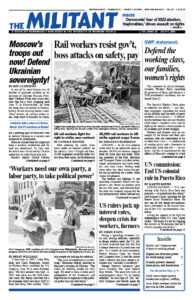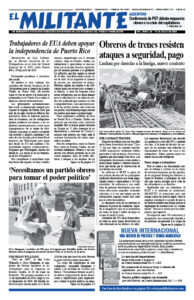UNITED NATIONS — “U.S. laws dealing with Puerto Rico have one purpose — to perpetuate the colony,” said Richard López, speaking for the Puerto Rican Nationalist Party. He was one of two dozen pro-independence petitioners at the annual hearing of the U.N. decolonization committee.
Calling for support to the fight for independence from U.S. rule, López added, “We know it’s not by begging the masters in Washington that we’ll achieve equality and justice.”
As in previous years, the U.N. committee adopted a resolution, introduced by Cuba’s revolutionary government and co-sponsored by six other governments, ratifying “the inalienable right of the people of Puerto Rico to self-determination and independence.”
Speakers described the economic and social disaster facing working people on the island, made worse by measures taken by the colonial government and enforced by a U.S.-imposed “financial oversight” board to make workers and farmers shoulder the burden for payments to wealthy bondholders on a $74 billion public debt.
The root of the problem, said Juan Dalmau of the Puerto Rican Independence Party, is that “to this day, 124 years after making us a possession through military conquest, the U.S. government insists on maintaining Puerto Rico, a Latin American and Caribbean nation, subordinate to its rule. All fundamental decisions on our collective lives are made unilaterally” by Washington.
Since 1952 the U.S. government has tried to disguise its colonial rule by declaring Puerto Rico a “Commonwealth,” Ariel Hernández of the Sovereign Union Movement (MUS) said. But over the years, “this so-called showcase of democracy in the Caribbean has shattered,” leading to decades of economic crisis.
“Puerto Rico is a classic colony,” said Christina Mojica of Boricuas Unidos en la Diáspora.
As a colony, its people have been hit with an ongoing series of attacks by their overlords in Washington. Normahiram Pérez of Call to Action on Puerto Rico noted that the fiscal control board, set up by the Obama administration in 2016, has overseen the closure of hundreds of public schools, cuts in public employees’ pension funds, and other attacks on jobs and living standards of working people.
Protests demand ‘Luma out!’
Vanessa Ramos, president of the American Association of Jurists, pointed to moves to privatize Puerto Rico’s state-owned electrical company. The island’s government turned the utility’s power transmission and distribution network over to Luma Energy, a U.S.-Canadian company. Six years after Hurricane Maria devastated the island, blackouts and rate hikes continue, she said. “Tired of false promises, the people of Puerto Rico have forcefully made their response heard with demonstrations demanding ‘Luma get out!’”
One example of what colonial rule means, Lía Fiol-Matta of LatinoJustice PRLDEF said, was the U.S. Supreme Court ruling in April upholding a federal law denying Supplemental Security Income benefits to Puerto Rico’s residents.
Sara Lobman, speaking for the Socialist Workers Party, stated, “From the pharmaceutical plants to the food-processing industry, it is workers who produce [Puerto Rico’s] wealth, and U.S. and other capitalists who rake superprofits from their labor.” She demanded Washington cancel the island’s debt.
Working people in Puerto Rico and the U.S., Lobman said, have common interests, and workers here “have a vital stake in championing the fight for Puerto Rico’s independence.”
“Cuba’s socialist revolution points a road forward,” she said. It shows how workers and farmers can lead a successful fight to take political power and win genuine independence and freedom.
Several petitioners described the migration of hundreds of thousands to the U.S. over the past decade under the blows of the capitalist economic crisis. They condemned Act 60, a law giving big tax breaks to foreign business owners who establish residence in Puerto Rico, and said this has led to wealthy U.S. investors buying up properties on the island, driving up real estate prices and rents. In March, dozens of residents of Puerta de Tierra, a working-class neighborhood in San Juan, marched to protest moves to displace them.
Some speakers argued that this “gentrification” was a deliberate effort to depopulate Puerto Rico. In fact, working people around the world face housing crises, driven by the normal workings of capitalism, under which land and housing are commodities bought and sold for profit.
This year, former colonial Gov. Ricardo Rosselló headed a delegation of a dozen individuals to speak at the decolonization hearing in favor of Puerto Rico becoming a U.S. state. They hailed a draft U.S. congressional bill backed both by pro-statehood forces and Democrats, including Reps. Nydia Velázquez and Alexandria Ocasio-Cortez.
If adopted, the measure would lead to a referendum allowing Puerto Ricans the choice of voting for statehood, independence, or a status described as “sovereignty in free association with the U.S.”
This proposal is part of efforts by Democrats to promote statehood for both Washington, D.C., and Puerto Rico, seeking to shift the composition of the U.S. House of Representatives and Senate in their party’s favor.
At the U.N. hearing, pro-statehood speakers agreed Puerto Rico is a U.S. colony, but argued the only way to end second-class status is for it to become the 51st state. They bragged about a 2020 nonbinding plebiscite where 53% voted for statehood.
Pro-independence speakers answered these claims, explaining that Puerto Rico has had six previous status plebiscites that changed nothing, including the 2020 referendum, where the low turnout meant the pro-statehood vote represented barely a quarter of adult residents.
Moreover, said Eduardo Villanueva of the Puerto Rico Bar Association, any plebiscite organized by the U.S. government would have no legitimacy. “Decolonization will be decided by the colonized, not the colonizer,” Vanessa Ramos added.
Ben Ramos of ProLibertad pointed out that Rosselló himself was forced to resign as governor in 2019 amid massive demonstrations.
Before and after the U.N. event, pro-independence groups held several actions in New York, including a panel discussion featuring several of the petitioners and a rally outside the U.N. of over 100 after the hearing.

